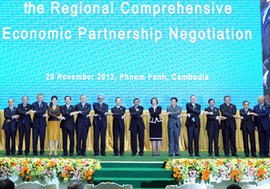According to the Ministry of Commerce, the Regional Comprehensive Economic Partnership (RCEP) will enter into force on January 1, 2022. Many foreign trade enterprises in China's textile industry will benefit from this agreement. RCEP not only brings direct "dividends" such as tariff reduction and exemption, investment and trade facilitation, but also helps to reconstruct the industrial value chain in East Asia and accelerate the economic recovery process of various countries. It will also bring many benefits to my country's textile industry.

The 15 member countries of RCEP include ten ASEAN countries, as well as China, Japan, South Korea, Australia, and New Zealand. Their total population, economic volume, and trade volume all account for about 30% of the global total. Therefore, RCEP is also known as "the world's largest free trade zone".

The head of the International Department of the Ministry of Commerce of China said that the official entry into force of RCEP is a new major development in the regional economic integration of East Asia. trade creation effect.

The person in charge said that after the agreement takes effect, more than 90% of the trade in goods among the approved members will eventually achieve zero tariffs, and the tariffs will be reduced to zero immediately and to zero within 10 years. Fulfilling the promise of commodity trade liberalization in a short period of time will have a far-reaching positive impact on my country's textile industry to expand the scale of foreign trade and deepen cooperation in the industrial chain and supply chain within the region.
Before the signing of RCEP, China had established bilateral free trade agreements with most RCEP member countries. But with RCEP, "bilateral cooperation" between China and other member states will be upgraded to "multilateral cooperation" in East Asia. Including, China and Japan, the world's second and third largest economies, will also form a zero-tariff free trade arrangement for the first time: China will eventually reduce tariffs on 86% of Japanese products to zero, and Japan will eventually reduce tariffs on 88% of Chinese products. Product tariffs were eventually reduced to zero. This will be good for my country's textile and apparel exports.
"China is ready to implement RCEP." The head of the International Department of the Ministry of Commerce of China said recently that the Ministry of Commerce has held three national RCEP special trainings, covering all prefecture-level cities, pilot free trade zones and national economic development zones. There are more than 66,000 people, and more than 70% are corporate representatives.
After the official entry into force of RCEP, it will greatly optimize the overall business environment in the region, promote the substantial growth of intra-regional trade and investment, and bring vigorous business opportunities.
In the field of trade in services, the level of openness of countries under RCEP is significantly higher than their respective "10+1" agreements, covering many important fields such as finance, telecommunications, transportation, tourism, education, etc., and will be fully transformed within six years of entry into force. Negative list to further improve the level of opening up.
In the field of investment, all members have made high-quality commitments by adopting the negative list method for non-service investment, and no new restrictions will be added to the list. At the same time, the level of investment protection has been strengthened, which is conducive to the mutual expansion of investment by enterprises in various countries in the region and is also conducive to China Enterprises "go out". This is also a rare opportunity for Chinese textile enterprises.

The textile industry should give full play to the comprehensive advantages of my country's complete industrial chain and complete supporting facilities, and continuously improve its international competitiveness. For the textile industry, after RCEP takes effect, enterprises can introduce advanced equipment from Japan, strengthen cooperation in production capacity, and upgrade the textile and garment industry.
Yu Benlin, director of the International Department of the Ministry of Commerce, said that after the full implementation of RCEP, it will drive nearly one-third of the world's economic volume to form a unified super-large market, and the development space is extremely broad, which will inject strong impetus into regional and global economic growth.
Tags :